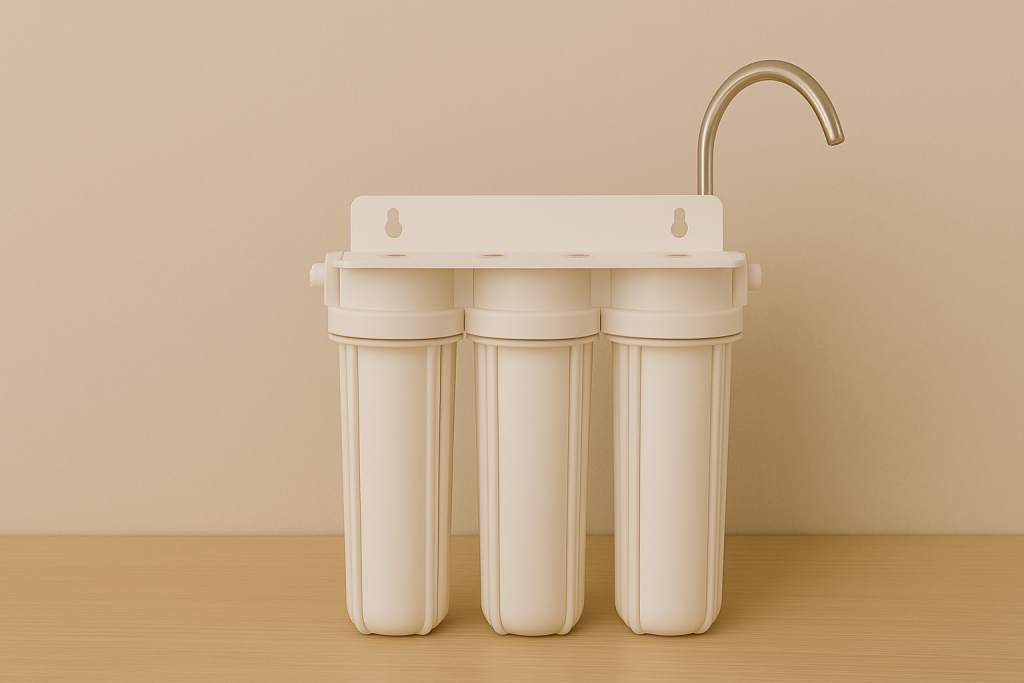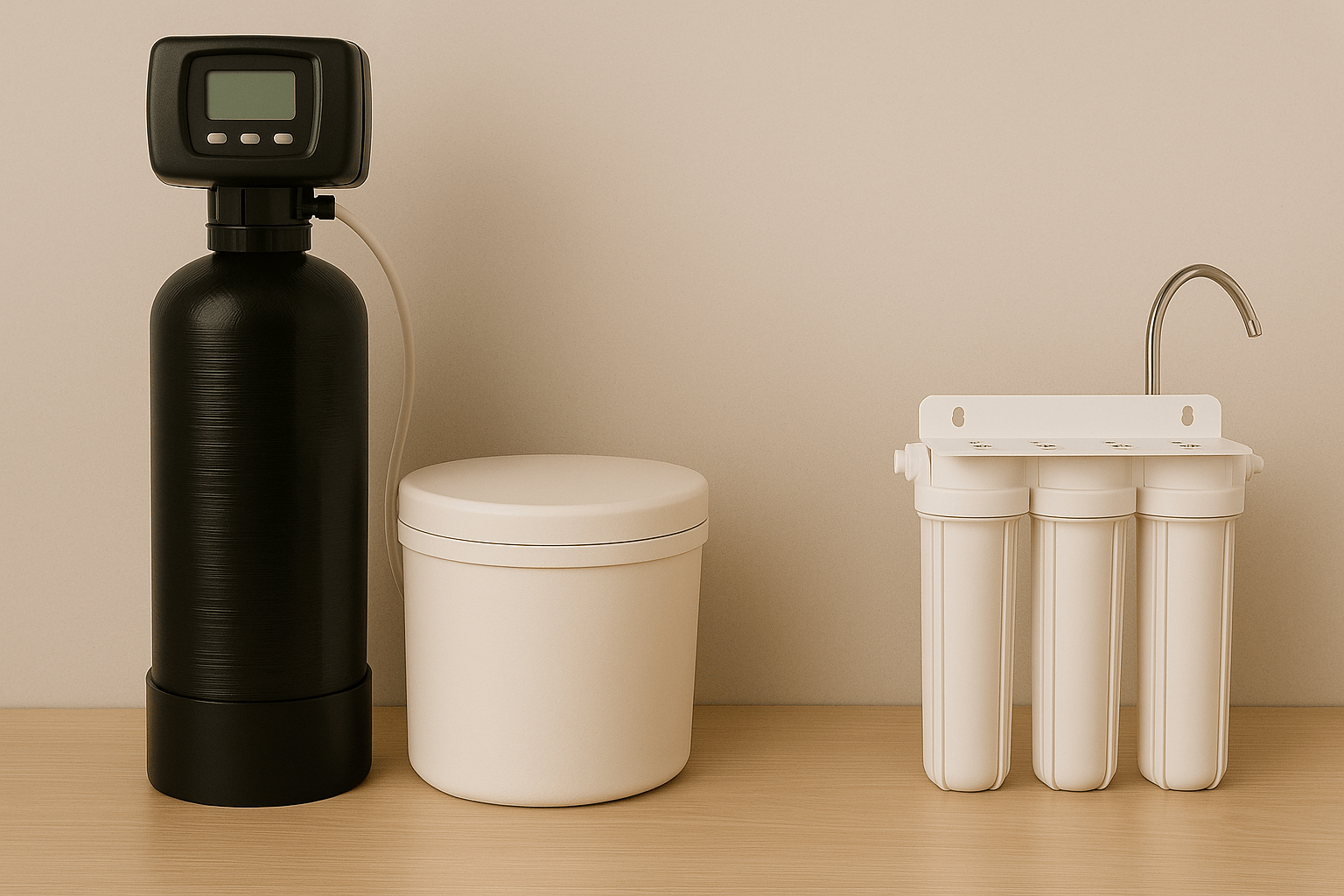If you’re deciding between a water softener and a water filter, it’s important to understand what each system does and which one fits your needs. A water softener removes minerals that cause hard water, while a water filter removes contaminants that affect the safety and taste of your water. This guide explains water softener vs water filter, and helps you choose the right solution for your home.
What Is a Water Softener?
A water softener is a whole-house water treatment system that uses ion exchange to remove hardness minerals, mainly calcium and magnesium. These minerals aren’t considered harmful to your health, but they can damage plumbing systems, reduce appliance efficiency, and leave unpleasant residue on your skin, hair, and household surfaces.
Key Benefits of a Water Softener:
- Eliminates scale buildup in pipes and water heaters
- Extends the life of appliances like washing machines and dishwashers
- Improves water pressure by preventing clogging
- Enhances soap lather and reduces soap and detergent use
- Reduces dry skin, itchy scalp, and mineral buildup on hair
Signs You Might Need One:
- Hard water spots on dishes and shower doors
- Reduced water pressure
- High utility bills due to clogged pipes or scaled heating elements
- Clothes feel stiff or rough after laundry
- Skin and hair feel dry even after moisturizing
What Is a Water Filter?

A water filter targets contaminants in the water, such as chlorine, lead, sediment, rust, pesticides, bacteria, and other chemicals. These pollutants can affect the smell, taste, and overall safety of your water, especially if you rely on a private well or have aging municipal water infrastructure.
There are many types of water filters, including carbon filters, reverse osmosis systems, sediment filters, and UV purifiers.
Key Benefits of a Water Filter:
- Improves the taste and smell of tap water
- Removes harmful chemicals and heavy metals
- Reduces exposure to bacteria, viruses, and other microorganisms
- Provides safer water for drinking, cooking, and bathing
Signs You Might Need a Filter:
- Bad taste or chlorine smell in your water
- Discolored, cloudy, or murky tap water
- Use of well water or outdated plumbing
- Family members experiencing digestive or skin issues
- Local alerts about contamination or water advisories
Water Softener vs Water Filter: Understanding the Difference
While both systems improve water quality, they solve different problems. The difference between water softeners and water filter systems lies in their function—one treats mineral hardness, and the other targets harmful contaminants.
Here’s a simple side-by-side comparison:
| Feature | Water Softener | Water Filter |
| Removes calcium and magnesium | Yes | No |
| Removes chlorine, lead, bacteria | No | Yes |
| Helps with appliance longevity | Yes | Yes (when filtering sediment) |
| Improves taste and odor | No | Yes |
| Makes water safer to drink | No | Yes |
| Softens skin and hair | Yes | No |
Do You Need a Water Softener, a Water Filter, or Both?
The best solution depends on your water source, lifestyle, and goals. Here’s how to determine what you need.
Only Need a Water Softener If:
- Your municipal water report shows high mineral content but low contamination
- Your goal is to prevent scale buildup and improve water efficiency
- You’re already using a separate drinking water filter
You May Only Need a Water Filter If:
- Your water is naturally soft or treated by your municipality
- You notice unpleasant smells, tastes, or discoloration
- You’re more concerned about chemical or bacterial contamination than mineral content
Likely Need Both If:
- You use well water, which can be both hard and contaminated
- Your water leaves spots on dishes and also smells like chlorine
- You want whole-house protection with clean, soft water for drinking, cleaning, and bathing
Real-World Scenarios: What System Makes Sense?
| Homeowner Situation | Recommended Solution |
| White spots, limescale on fixtures | Water Softener |
| Strong chlorine smell in drinking water | Water Filter (Carbon) |
| Rust stains and discoloration | Iron Filter + Softener |
| Cloudy water with poor taste | Reverse Osmosis Filter |
| Well water with unknown quality | Full Combo System (Filter + Softener) |
Why Combo Systems Are Growing in Popularity
Many modern homes opt for a combo water softener and filtration system to address a wide range of water issues in one installation. These systems are typically installed at the point of entry, so every faucet in your home delivers cleaner, softer water.
Benefits of combo systems:
- Comprehensive protection from scale and contaminants
- Enhanced lifespan of plumbing and water-using appliances
- Peace of mind knowing your water is both safe and efficient
- Less need for bottled water or separate filters for every tap
Before installation, always test your water to determine the right type of filter and the hardness level, especially if you rely on well water.
Take the First Step to Cleaner, Safer Water
Not sure if you need a water softener, a water filter, or both? Pristine Water Softeners makes it easy with free water testing and expert advice tailored to your home’s water quality. Our team will walk you through the best solution to protect your appliances from hard water damage, improve the taste and safety of your drinking water, and ensure clean water flows through every tap in your home. Instead of guessing what your water needs, take action with confidence.
Contact Us today to schedule your free water test and start enjoying better water every day. Visit our Contact Us page to get started.


